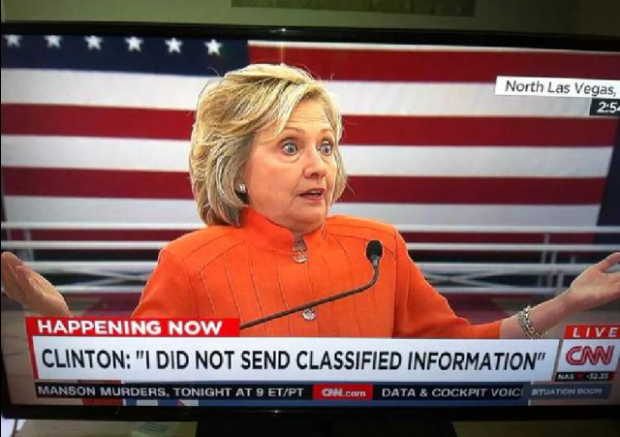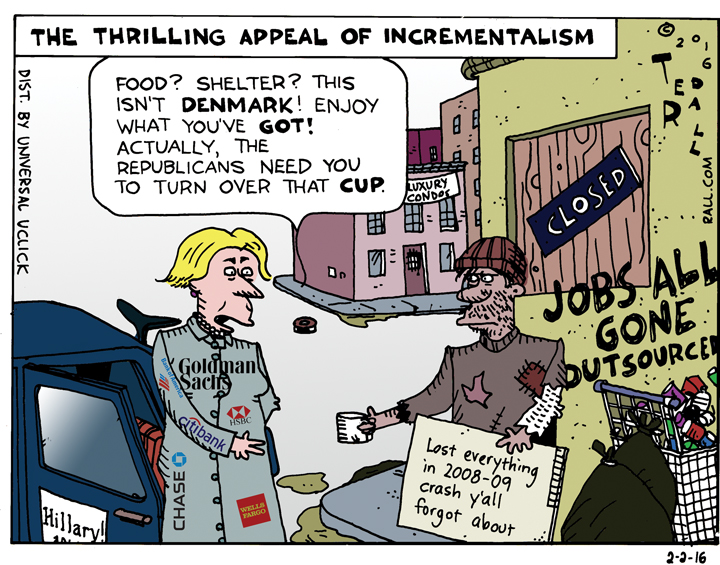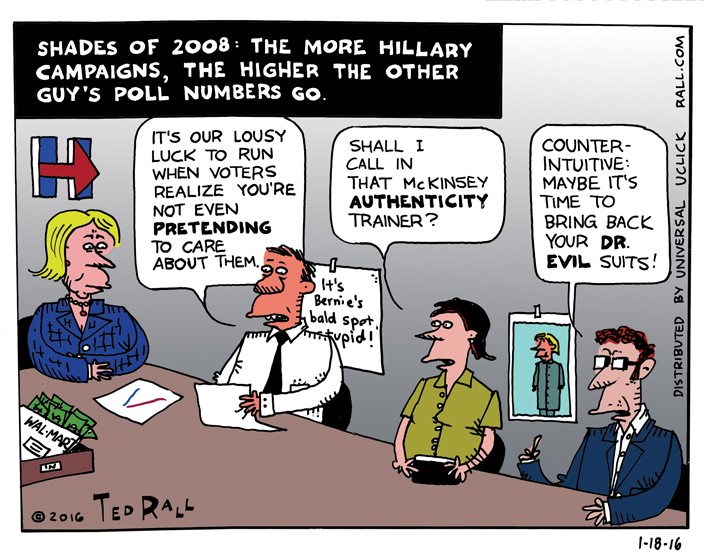
To her enemies and many of her supporters, the brief on Hillary Clinton is that she’s evil but smart. “Smart leadership for the 21st century,” declares her website. Cynical and calculating she may be, people say. Sure, she’s an opportunist. But she knows the American political system inside and out — so she’ll be able to work her Machiavellian magic as president. Hopefully, on our behalf.
In this case, conventional wisdom is 100% wrong. Hillary’s intentions may or may not be purely self-serving. But she’s far from the political genius she’s being portrayed.
She may or may not be evil. But she certainly isn’t smart.
Look at the former senator’s vote in favor of the Iraq War. An evil decision? Maybe. While the results were catastrophic, there’s no way to see into her soul. Maybe she wanted to liberate Iraqis from dictatorship. Saddam was a tyrant. We’ll never know what she was really thinking.
What we know for sure is that that vote was political suicide. It caused her to lose the presidency to Barack Obama in 2008. It hobbled her in her primary campaign against Bernie Sanders.
This is not one of those hindsight-is-20/20 things. During the run-up to the war in late 2002/early 2003, many smart people expected the war to go badly exactly the way that it did. Leftist opinion columnists and editorial cartoonists (cough cough) repeatedly scoffed at Cheney’s claim that our invasion troops would be “welcomed as liberators.” Middle East experts correctly predicted the chaos, sectarian violence, regional destabilization and Islamist radicalization that would fill the power vacuum created by the overthrow of Saddam. Millions of citizens marched in the streets to oppose this optional war. It didn’t take a genius to see it coming — but she didn’t.
Only fools believed the Bush Administration’s nonexistent evidence (c.f. random metal tubes) and ridiculous rationale for war (“what if Saddam somehow built a nuke, then made friends with his mortal enemies, then gave those terrorist enemies his nukes as a gift, and then what if they figured out some way to ship them to the U.S.?”). Neocon fools. Republican fools. Fools like Hillary Clinton.
Hillary’s apologists say she had no choice. That, in the face of bloodthirsty voters’ lust for vengeance post-9/11, she had to act tough. But that’s nonsense. Senator Clinton represented liberal New York, where the war was unpopular from day one. She wouldn’t face reelection until 2006 or the presidential race until 2008 — three to five years after casting her vote. Just as the antiwar crowd predicted — yet Hillary was unable to — the Iraq War began going badly within months. By early 2005, most voters thought it was a mistake. A sharp politician would have anticipated that. A smart presidential aspirant, able to anticipate how things would play out in Mesopotamia, would have placed her chips on the antiwar side of the political betting table.
Then there’s her email scandal.
What was she thinking? Can she think?
When Clinton took over the State Department in 2009, she was already planning to run for president in 2016. She and her husband have come under GOP attack throughout their careers. Given the sharp scrutiny she was sure to come under seven years hence, why didn’t she order her staff to follow the government rules concerning email to the letter? A savvy political insider would have gone by the book, erring on the side of conservatism, rather than use a private email server for classified government correspondence. She was a moron. Now she faces a possible indictment.
Incident after incident indicates that the Smart Hillary construct is as much of a fantasy as her supposed record of progressivism.
It’s been obvious for a while now that 2016 was shaping up as the Year of the Political Outsider. Both parties are relying on their base to win, rather than the swing voters who were so important during the Clinton 1990s. The Tea Party and Occupy Wall Street movements, and numerous polls, pointed to widespread disenchantment with the establishment. Yet Hillary acted like it was 1993, tacking center-right like the corporatist she is. She solicited the usual old big donors.
She even gave speeches to Goldman Sachs. In 2013!
Hillary radically underestimated the Bernie insurgency. Her messaging has been relentlessly tonedeaf, as when her aging surrogates Madeleine Albright and Gloria Steinem insultingly old-splained to young female voters that they owed her their votes. Less than a year ago, Hillary was still pimping every job-killing “free trade” deal she heard about — even though they were unpopular with voters. Now Hillary is running out of money and losing momentum to a socialist who is eating her lunch in primary states she took for granted.
Time after time, over and over, Hillary proves she doesn’t get it. She’s not intuitive. She has no sense of what people are/must be thinking. She’s incurious, failing to feel shifts in opinion or circumstance. She’s stuck in the past. She wallows in her bubble. Which, when you consider that even the wealthy patrician FDR had a strong sense of what voters cared about, is frightening.
In a Democratic debate, she brags about her bromance with Henry Kissinger, telling liberals — who consider him a war criminal — that she relies on Nixon’s deviant mad bomber for foreign policy advice.
At another debate, she conflates Bernie Sanders’ vote against the Wall Street bailout with a refusal to help the auto industry. Even in Michigan, no one is fooled. Does she think we’ve forgotten how gross that Bush-Obama bailout was?
After Nancy Reagan dies, she gives the Reagans credit for starting a “national conversation” about HIV/AIDS. The Reagans were disgusting homophobes, pleased as punch that gays were dying en masse. They refused to fund research to fight the disease. They started a national conversation about HIV/AIDS the way Hitler started a national conversation on Jews. Now she says she “misspoke,” that ultimate all-purpose meaningless verb.
Could this be similar to her amazing statement to a black voter that no one had ever asked her about her support for the 1994 Clinton crime bill, which sent millions of black people to prison for minor offenses? How is this possible? Did Hillary really not know about the Reagans’ antigay bigotry? Or was she lying but assumed no one would notice? Either way: idiotic.
Vote for Hillary if you want. But don’t vote for her because she’s smart.
She is many things.
Smart isn’t one of them.
(Ted Rall is the author of “Bernie,” a biography written with the cooperation of Democratic presidential candidate Bernie Sanders. “Bernie” is now on sale online and at all good bookstores.)





 Full disclosure: If New York’s primary were held today — not that it typically has a significant electoral impact, since it’s relatively late on the calendar — I’d vote for Bernie Sanders.
Full disclosure: If New York’s primary were held today — not that it typically has a significant electoral impact, since it’s relatively late on the calendar — I’d vote for Bernie Sanders.
